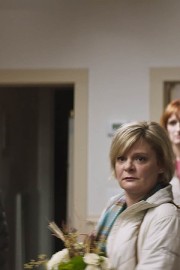Mass
**Seen at the 2021 Sundance Film Festival.
Grief, empathy and understanding are at the forefront of “Mass”- that all of those are linked to a tragedy like a mass shooting is a fundamental part of the film, but not the only part of the film. Sure, we are familiar with a lot of the words said in this film, but their context is in the attempt to come together with one another without attack each other. Given the divide in our present political atmosphere, maybe Fran Kranz’s directorial debut can off a way towards that understanding.
The film begins with a woman (Michelle N. Carter) coming in to a church, and making sure everything is ready for a meeting. The church representative (Breeda Wool) is a bit nervous, and has over-compensated in providing food and drinks for the meeting, but she’s reassured that it should be fine. We then see as a couple (Jason Isaacs and Martha Plimpton) show up at the church, but are not yet ready to go in, so they drive away. She’s not sure whether she’ll be able to say something she wants to say, and then they drive back. They are led to the meeting room. Throughout there are awkward silences and moments between everyone. And then, the other couple (Reed Birney and Anne Dowd) arrive; they have all met before, but it’s been a while. Dowd’s character has a plant she wants to give them. They all sit down, and the meeting begins.
“Mass” is not about the political debate about gun control, but more about cutting through the cliches we hear every time after a mass shooting. You see, Dowd and Birney are the parents of the shooter, and Isaacs and Plimpton are the parents of a victim. The sit-down between the four threatens to devolve into a discussion about gun control, which Isaacs has become an advocate for in the years since the shooting, but the women try to reign in the discussion away from those issues and get down to the personal. The two couples try to share personal stories about their living children, and even something about the children they lost, but the wounds are still too deep, and the conversation threatens to derail. The victim’s parents want answers as to what signs might have been seen by the shooter’s parents that possibly were overlooked, and the shooter’s parents want them to put a human face on their son, even through the violence, physical and psychological, that he caused. All four are trying to be parents, looking for a degree of justice for the children they lost, and it is a profoundly moving experience to watch unfold.
Kranz’s directorial approach is claustrophobic, not just because they are in a room together, but because he uses a lot of coverage and close-ups of the faces of these four rather than wide shots of them just sitting at the table; even when characters leave the table, the camera stays at the table, and it is a smart decision on his part cinematically, and also as a director of his actors. And his actors positively shine here. A lot of people will gravitate towards the frustration and force of Isaacs or the motherly heartache from Dowd, but Plimpton and Birney have plenty of moments, especially when recalling moments with their children, that are emotionally crushing to watch. They are the sort of performances that feel natural for an actor-turned-director to get from actors, and don’t be surprised if there is much discussion about them come Oscar time next year. But awards are the furthest thing on “Mass’s” mind. This film is about getting past pain, anger and other selfish emotions, and finding something to connect with in someone else, even when you have no reason to do so on the surface. The result is devastating.










